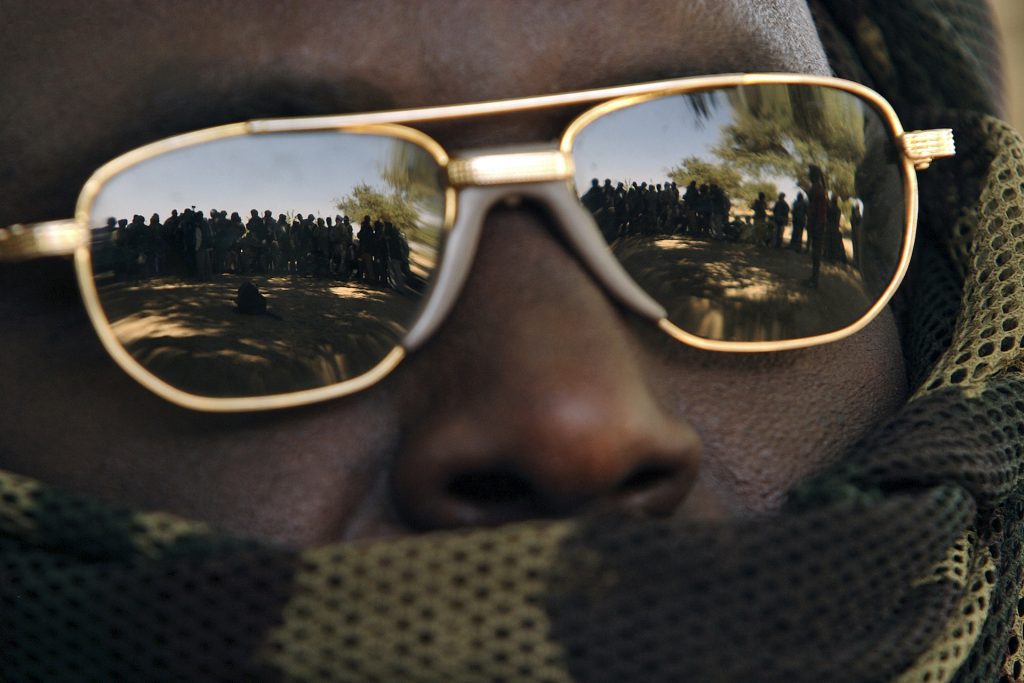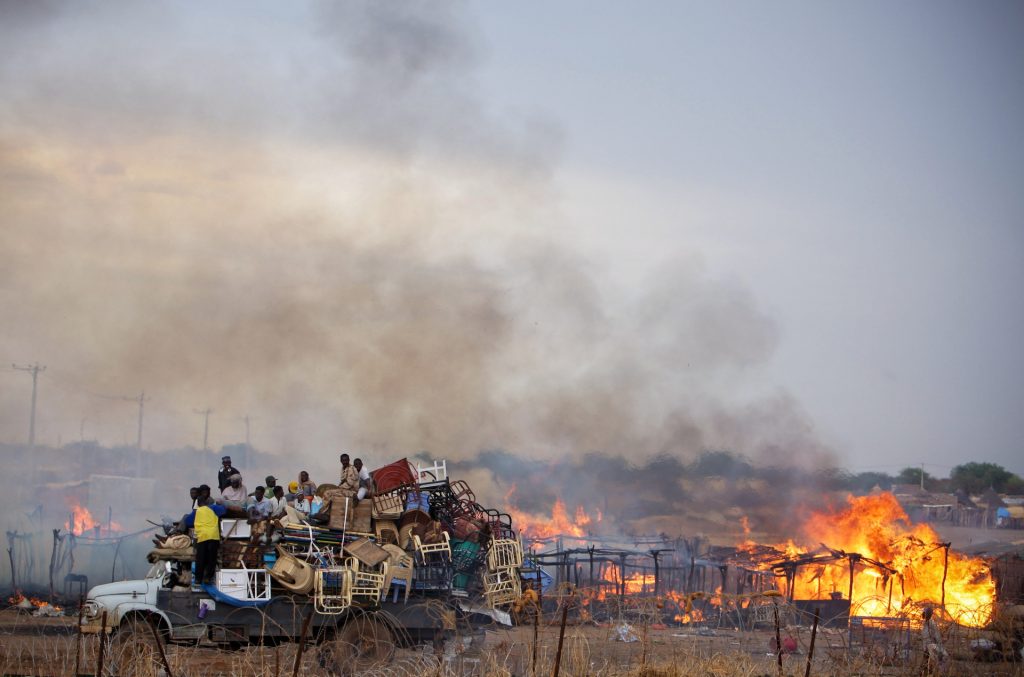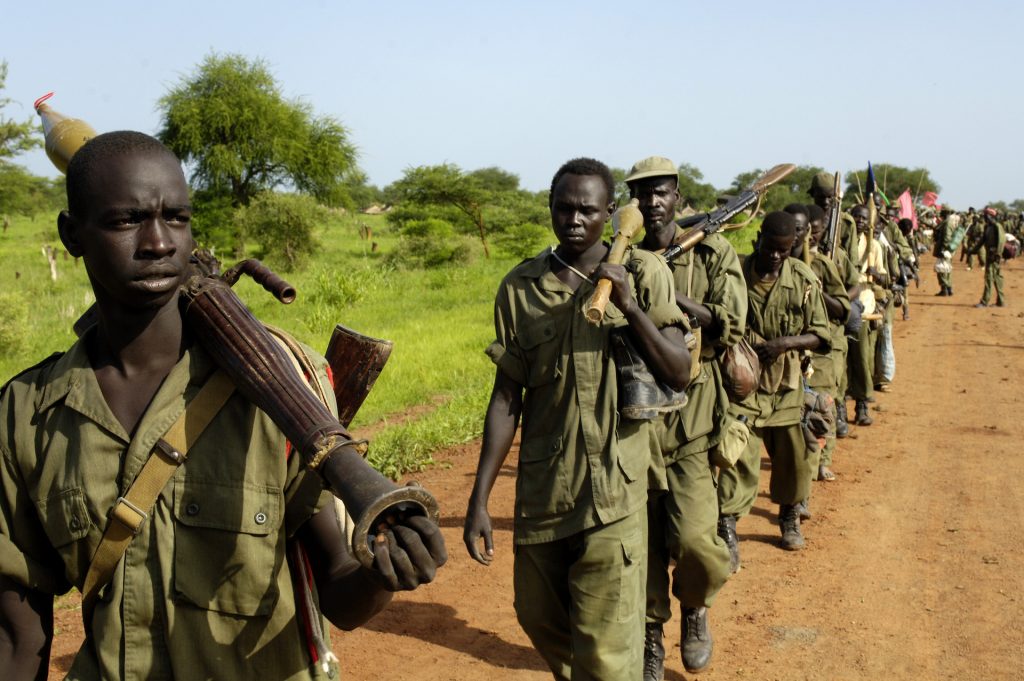This Is Why He Has War In His Heart

The soldier striding into my office didn’t smile; his worn fatigues bore the insignia of the South Sudanese Army. He introduced himself through his translator as Lt. Rashadd and offered me a limp but sweaty palm. I greeted him and motioned for him to take a seat.
Instead, he eyed me with a feral glare as if considering whether to indulge my hospitality or to conduct his business standing as he towered over me.
He finally unwound his long, lean body into a chair. He had thin facial features with a dark glint in his eyes as if holding something in that could burst free at any moment.
I held my breath, a bit confused as to his visit. As the Head of Office for the U.N. peacekeeping operation here in Abyei, a square of disputed desert suddenly strategic because of its location on the border and a nearby oilfield, I’d met many of the senior military officers of the warring factions. I’d never met Lt. Rashadd before this moment. I’d never even seen his face during my many trips to the camps.
Our U.N. razor-wire wrapped compound was sandwiched between the Sudanese National Army just north of us, and the Sudanese People’s Liberation Army to the south. During my visits, the officers were genial and gracious, as if all the killing and marauding they each participated in was nothing more than a lark in between invitations to coffee.
But this man had a twitch to him; something dark percolated inside.
Conversing With The Raging Soldier
My translator, who stood by the door, must have sensed something amiss because he came around the desk and stood by me, facing the soldier and his man.
The Lieutenant spoke rapid Arabic.
“He has come for payment for the water,” my translator leaned over me and repeated the man’s words in accented but clear English.
“The water?”
The Lieutenant barely waited for the translation before he burst into a rage of Arabic. “The water, the two trucks full. I want the cash now.” Even after the translator repeated his statement in subdued English, the man’s angry words echoed in the room.
Of course, the water. Last week, our well-pump stopped working and our engineering staff ordered parts for the repair. In the meantime, I’d sent our water truck to the south Sudanese camp to purchase what we needed. We drew two tankers full from the army camp well, a well the U.N. had drilled and paid for. The part had arrived on the resupply flight and our wells were now up and pumping.
I explained to him that I knew of the outstanding bill, which was less than $1,000 U.S., and had sent to Khartoum for the cash. It would come out on our weekly helicopter resupply next week. When it arrived, I would inform his commander, and he could send someone over from finance.
He shook his head violently, “No. No. No.” He jabbed the air between us with his finger. “You must pay now. Now!”
I began to think he was high on something. Whatever it was, he possessed a coiled violence, and it slowly unwound in front of me. Calmly, I explained to him we don’t keep cash at our compound. It comes from HQ in Khartoum. But it would be here soon, and I would be glad to call him over when it arrives if he is the one handling the finances.
The soldier leaned toward me, his eyes now red with rage. “You must pay now.” He thumped the edge of my desk with his fist. “Now. I have to have it now!” His voice was deep, insistent, threatening, and he continued to pound my desk.
I didn’t need the translation to know this man was not only out of order but on the verge of spinning out-of-control. My heart began to race, and I took deep breathes to calm myself. My years as a labor negotiator taught me the importance of staying calm, not reacting to his temper tantrum.

SUDAN, Abyei: A photograph released by the United Nations Mission in Sudan (UNMIS) 28 May, UNMIS PHOTO / STUART PRICE.
Life In A War Zone
Life here had a hair-trigger sense to it. At any moment, some dispute over land or cattle or water could easily escalate into shooting, killing, and possibly tip over into another cycle of tragedy. But not here in my office, not with security staff everywhere in the compound.
Certain if I remained calm he would back down, I kept my voice low, but insistent. I told him it would take another week for the cash to arrive.
He pounded my desk with his big fist, again and again, demanding the money. He stood, shouting at me across my desk. I remained seated, frozen in shock that he thought he could get me to do something I had no ability to do. I tried to calm him, reassuring him repeatedly he would have the money, but not now. That only infuriated him more.
My translator slipped out of the room. With Lt. Rashadd leaning across my desk, I pushed my chair further back. I was now alone with this maniac. I reached for the two-way radio on my desk. I needed security. He glared at me. Was he hopped up on drugs? Did he want this money for a drug deal? I knew he wasn’t from finance.
Thoughts of not seeing my wife and kids again slipped through my mind.
He kept demanding, “Now. Pay me. Pay me.”
As the man’s mouth moved, throwing out a string of Arabic words, a euphoric rage burned in the whites of his eyes. With my office chair flush to the back wall, everything inside me thumped. Was this how I died, at the hands of an out-of-control soldier?
I’d always been able to talk my way out of difficult situations by working to understand my opponent’s point of view. Watching him inch closer to me, a stream of spittle on one side of his mouth, it dawned on me there was nothing to negotiate here: this man was pure hate, his visceral rage came from somewhere deep, deeper than I’d ever witnessed. He could easily kill me if he had a weapon. It would mean nothing to him to see me die.
Though I’d never been in combat, this must be what pure evil looked like. This was not a cool-headed killer, but a man with no boundaries. Something had destroyed him the way he wanted now to destroy me.
Is this what drove men to kill so easily, rage that eviscerated any sense of morality?
War In His Heart

SPLA soldiers redeploy south from the Abyei area in line with the roadmap to resolve the Abyei crisis.
“Lieutenant!” A strong voice called to him from the door. My translator, seeing the danger, had summoned one of the liaison officers who were regularly in our compound. It took several minutes for the officer to calm the soldier. The colonel assured Lt. Rashadd the situation would be handled properly and he didn’t need to interfere. He finally ordered him to return to camp. The soldier threw me a hateful look before he turned and stomped out.
After profuse apologies and a handshake, the colonel left me alone in my office. For the first time, I realized my shirt and face were soaked.
My translator stood in the door, an apologetic look in his face. He told me that he knew of Rashadd and many more like him. He also said I must not hold his behavior against him. As a child, the army took him from his village and taught him to kill. All through the years of his childhood, he had been nothing but a soldier, killing, destroying villages, indulging in the excesses of a war of annihilation.
“He has war in his heart,” my translator said. “There are so many here like him.”
Rashadd didn’t look older than twenty, but he’d already seen a lifetime of killing and hate. And he had just given me a glimpse of what had been bred into him. What would peace look like in this land with so many Rashadds in the marketplace, at home with their families, or in their communities?
What future did these people have unless they could find a meaningful peace?
Keeping The Peace
I collected myself and after a moment’s reflection realized that was what I’d come here to do—to keep the peace. The two sides had signed a truce, but that was just a piece of paper. Someone had to stand between the warring factions, teach them again how to get along, that there was more to life than constant war. That was my mission. That was what woke me up every morning.
Still, after twenty years of work, we were so far from any lasting peace, here or anywhere else I’d been assigned.
Sudan would be my last regular posting before retirement, and as I began to relax again after the soldiers left, I remembered it all, the day I first thought of joining up and leaving my comfortable job in the suburbs to travel the world on a mission of peace…
Wow. Intense and yet so much understanding here. Most of us have had no understanding of the lives of those who live this…on both sides.
I agree with Holly. What a fantastic and empathetic post.